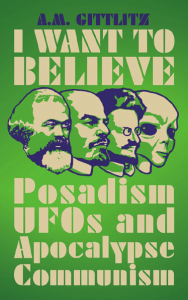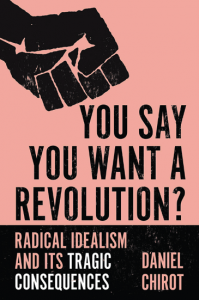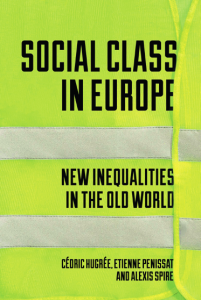Book Reviews:
A Trotskyist Oddity
 I Want To Believe: Posadism, UFOs and apocalypse communism by A.M. Gittlitz. Pluto Press, 9780745340777
I Want To Believe: Posadism, UFOs and apocalypse communism by A.M. Gittlitz. Pluto Press, 9780745340777
The Argentinian Trotskyist J. Posadas is mostly known among left trainspotter circles for his belief in UFOs and advocacy of nuclear war. This book reveals a different story. Rather than a crankish outlier, he is revealed as pretty much a typical guru of a Trotskyist sect, with policies and positions typical of mainstream Trotskyism.
Born Homero Cristalli, in 1912 in Buenos Aires, he was the child of Italian immigrant shoemakers, who were themselves involved in left-wing politics. He grew up malnourished, and became an entertainer, and (briefly) a professional footballer. Football would be an enduring feature of his life, and his cadres at conferences would be required to have a match, leading in one instance to the French police being called to their supposedly secret meeting place because neighbours heard the shouting.
He became involved in the radical Buenos Aires milieu, and came to the notice of a group of Trotskyists after a short poem calling for unity with the Spanish government (during the civil war) he wrote was published in a left newspaper. The group, the International Communist League (LCI) had been typified as ‘coffee-bar wankers’ (the author, incorrectly, attributes this to Trotsky himself), and were seeking to break out of their intellectual ghetto and connect with the working class.
Cristalli proved to be an enthusiastic and energetic organiser, and made successful work with the shoemakers union. His working class authenticity made up for his limited theoretical grasp of Trotskyist positions. J. Posadas was a collective name of the group’s leadership, and Cristalli began to join in writing Posadas’s editorials. Eventually, he would possess the name entirely (the ‘J.’ was never defined).
Although Trotsky is venerated in many parts for his theoretical subtlety, in reality, his plans amounted to ‘go back to your constituencies and prepare for civil war’. His orientation was to try and form the command/control of a military force that could win that civil war, hence his and his followers focus on leadership. In practice this usually meant small groups trying to orientate towards and piggyback on bigger movements. In Argentina, this meant the strongman Juan Peron, who successfully co-opted the workers movement for his own ends.
Cristalli became a full time revolutionary, depending on the income his faction could bring in from its membership in the Fourth International, and he came to prominence in the internecine manoeuvring of the factions in the international, and became a supporter of Michel Pablo, who ostensibly led the International after Trotsky’s murder. This position, along with his energy and charisma, led him to being among the pre-eminent Trotskyists in Latin America, eventually with groups in Cuba, Brazil and Ecuador.
When the Second World War failed to bring about the revolutionary wave Trotsky predicted, the Fourth International’s leadership veered between trying to enter mass communist parties or supporting anti-colonial guerrilla movements. Cristalli visited Cuba after the revolution there and ended up being singled out as a leader of the Fourth International by Castro as he denounced and suppressed Cuban Trotskyists.
It was the Cuban missile crisis that developed Cristalli’s position on nuclear weapons. He was, though, not alone in wanting a nuclear confrontation with America: Che Guevara and Castro both wanted the conflagration. Cristalli’s position was that the imperialist states would not surrender to socialism without using their nuclear weapons, such a confrontation was inevitable; but that with the greater population of the communist world, only communism could emerge from the aftermath. This was simply a logical continuation of the basic position of Trotskyism to a world with nuclear weapons.
His other famous position, on extra-terrestrials being communists, as in fact not his position. Gittliz reveals that his notorious essay, ‘Flying saucers, the process of matter and energy, science, the revolutionary and working-class struggle and the socialist future of mankind’, was in fact written to close down debate from an enthusiast for UFOs in his party. In some senses his argument ‘We must appeal to the beings on other planets, when they come here, to intervene and collaborate with Earth’s inhabitants in suppressing poverty. We must make this call to them’ (https://tinyurl.com/p3rut6m) is simply a continuation of the notion of appealing to powerful figures to try and make changes.
The UFOs simply became a distinguishing feature by which other Trotskyists could deride him and distinguish themselves from his organisation.
The secrecy of Cristalli’s organisation was essential in the face of real repression (some of the cadres were arrested and murdered by repressive regimes in Latin America). This, coupled with stern sexual moralism (including seeing homosexuality as degenerate) led to Cristalli controlling the sex lives of his cadres, separating married couples to work in different areas. He abandoned ‘democratic centralism’ in favour of his personal rule of the organisation, or ‘monolithism’.
It comes as no surprise to discover that he was caught receiving oral sex from a young female recruit. He responded in a fashion we are becoming accustomed to from the US president, of accusing all of his colleagues of being sexually promiscuous. He expelled them all, and then fathered a child with the recruit. As Gittlitz notes, this situation is not unique, and other Trotskyist sects had similar stories (Gerry Healy and the WRP springs to mind).
The book ends with an essay on the birth of the Posadas meme as a generation of young leftists rehabilitate the Ufological legend for the slogan ‘Fully automated space communism’, used ironically but still indicating a search for hope in a time of fallen ideas. Gittlitz points out that for a short period, references to Posadas outranked Trotsky himself in Google searches thanks to the memes.
P.S.
Minority revolutions
 You Say You Want a Revolution. Radical Idealism and its Tragic Consequences. By Daniel Chirot. Princeton University Press. 2020
You Say You Want a Revolution. Radical Idealism and its Tragic Consequences. By Daniel Chirot. Princeton University Press. 2020
This is a history book whose very title makes no bones about its purpose. The author’s stated aim is to warn against the ‘radical idealism’ which he sees as underlying many attempts at political revolution, since such action almost inevitably has ‘tragic consequences’ in terms of death, destruction and social disorder and rarely leads to worthwhile gain even in the longer term. As he puts it, ‘a strong revolutionary utopian ideology held as an absolute faith, if its believers come to power, will lead to immense human tragedy’.
Starting with France in 1789, the book takes us through the numerous risings that have convulsed societies in the last two hundred years, right up to the ‘Arab spring’ events of the present century. On the way he takes in the Meiji restoration in nineteenth century Japan, the Mexican and Russian revolutions, the Nazi takeover in Germany, Maoism in China, the anti-colonial wars in Algeria, Vietnam and Angola, Khmer Rouge rule in Cambodia, and the coming to power of Ayatollah Khomeini in Iran. What, he argues, characterizes all these episodes is that they were either brought on by radical ideologies that failed to live up to their promises of social and economic improvement and in fact had disastrous results for the people of the countries involved.
This is an argument the author makes compellingly, providing abundant, well documented evidence of the mayhem wrought by many in these chapters both in the short and long term. He dwells in particular on the horrors of Stalin’s rule in the Soviet Union and of Mao’s leadership in China, both of which caused the deaths, through famine, disease or extermination, of tens of millions of people. He shows too how many other countries with smaller populations suffered similar fates following violent uprisings or radical political change.
However, this book has little notion of any historical forces that might have been driving these events and even less of the idea that, in many cases, for all their disruption and bloodiness, they were the signal of a new form of production, capitalism, taking over, even if under a one-party government, from more antiquated social and economic forms. The author sees much depending on ‘the personality of leaders’ and on ‘chance events’, this being reflected in the title of one of his earlier books Modern Tyrants: The Power and Prevalence of Evil in Our Age. In so much as he has a sense of historical development, it is the belief he expresses that things progress best if those leading change can be, as he puts it, ‘gently liberal’, and there can be ‘gradual change, compromise and flexibility’.
A greater deficiency, moreover, for those likely to be reading this journal, is the author’s insistence that many of the revolutions he deals with were driven by the ideas of Marx and by socialist or communist ideology (‘the Russian, Chinese, and other successful communist revolutions were inspired by Marxism and killed tens of millions in order to achieve an impossible egalitarian ideal’), when in fact they were not aimed at establishing socialism but state capitalism, as happened in Russia and China. There is no warrant in Marx for state capitalism, even if those setting it up and running it call it socialism or communism, as has often been the case. Though no one has a patent on the word, socialism in Marx’s writing clearly involves abolition of the wages system and a worldwide society of from each according to ability, to each according to need, not state control of the economy, which is in fact just an alternative form of capitalism – state capitalism.
HOWARD MOSS
Classification
 Cédric Hugrée, Etienne Penissat and Alexis Spire: Social Class in Europe: New Inequalities in the Old World. Verso £16.99.
Cédric Hugrée, Etienne Penissat and Alexis Spire: Social Class in Europe: New Inequalities in the Old World. Verso £16.99.
Written by three French sociologists, this volume is based on studies carried out under the aegis of the European Union Statistical Office and makes use of the standardised European Socio-economic Groups classification of employment. This leads to the distinguishing of three classes: working class (including unskilled manual workers, nursing assistants and farmers); middle class (office workers, police officers, IT technicians, teachers, etc); and dominant class (doctors, senior managers, lawyers, journalists, CEOs, and so on). Probably the most surprising aspect of this is the identification of a dominant class, and it is claimed that the one percent, the super-elite, ‘need allies to ensure that their orders at work will be transmitted and fulfilled, and ultimately to secure their hegemonic position in society’ and that the dominant class ‘encompasses all workers who have the power to impose rules in professional, social and even political life’ (so it seems they are workers too).
It is true that many people in this ‘dominant class’ are in charge of managing and supervising others (as are some of the ‘middle class’), but this is hardly enough to make doctors and engineers ‘dominant’ in any sense. And when it is stated that CEOs on average have less disposable household income than teachers and nurses, it does raise questions as to how reliable the classifications are. The dominant class includes entrepreneurs, but since this label applies to street hawkers as well as factory owners, its usefulness appears limited.
Nevertheless, there is a lot of interesting information here (in this paragraph we use the book’s terminology, without implying that we agree with it). In Central and Eastern parts of the EU, the dominant class is much smaller than in the North and West, on account of the control of the economy there by some Western firms. Industrial production has a greater share of the economy in the East and Centre and in the Baltic countries. The ageing of the population in the North and West, plus the greater number of women at work, has led to increased demand for childcare, care of the elderly and so on. Over one-fifth of the working class live below the poverty line (earning less than 60 percent of the median wage in the country concerned). Members of the dominant class are far more likely than others to attend a live performance such as a play, and to speak an international language such as English or Spanish. Trade unions find it harder to operate and negotiate at an international level, partly because of language difficulties.
The conclusion states that ‘experience of hardship and suffering at work is the common ground between members of the working and middle classes’, and argues for transforming work to make it less hierarchical and pay more attention to health and the environment. But it will take more than this to do away with the inequality and poverty that are described, if not convincingly analysed, here.
PB
One Reply to “Book Reviews:”
Leave a Reply
You must be logged in to post a comment.

We have received the following from the author of the book on revolution.
Thank you for sending me this, It is a fair review even if, as you say, I might not agree with its conclusion.
I’m not sure I think it is worth entering into an argument because, as you well know, this is now an old dispute about Marxism that has generated millions of pages. I think that Lenin, Trotsky, Stalin, and Mao were careful readers of Marx’s work. So were many others of the major communist leaders. And many, though not all, had serious intellectual educations, like Pol Pot or Enver Hoxha. They thought they were Marxists. My favorite epigraph in my book is the Eric Hobsbawm quote:
“The possibility of dictatorship is implicit in any regime based on a single, irremovable party…And irremovability was merely another name for the total conviction of the Bolsheviks that the Revolution must not be reversed and that its fate was in their hands…Stalin showed a sound sense of public relations…His terrifying career makes no sense except as a stubborn, unbroken, pursuit of that utopian aim of a communist society to whose reassertion he devoted the last of his publications, a few months before his death.” Eric Hobsbawm[i]
[i] Eric Hobsbawm, The Age of Extremes: A History of the World, 1914-1991 (New York: Vintage / Random House, 1996), pp. 389-390.
I knew Hobsbawm somewhat and once spent almost a week with him at a conference I had organized in Bellagio on Lake Como. He was an utterly charming, persuasive, reasonable, extraordinarily learned life long communist. He had wonderful explanations of why he had always maintained his faith, but he never denied the brutality of what was required to create socialism. He eventually explained it all in his autobiography. The essence of it was that the tragedy was not all that suffering and death but that in the end it didn’t work.
I was personally influenced by a year I spent in Romania in 1970-71 doing research for my dissertation. Through a set of circumstances, I was placed into a research think tank attached to the Central Committee, with offices across the street from the imposing Central Committee building in the center of Bucharest. There I made friends with exceptionally talented young people my age, in their mid- to late 20s, assigned to this group because they were highly educated, knew many languages, and were devoted to the Party. Later, as I returned many times for visits, I found out that they had all become deeply disillusioned. What eventually struck me the most was the petty corruption, cruelty, indignities, and moral vacuity of the system.
I completely agree that is not at all what Marx had hoped for. And indeed, China’s solution to the empty promise of Marxism is to create an almost textbook version of fascism. Mao once said that if communism in China fails it will become fascist. He was right. How sad.
Best wishes,
Dan Chirot